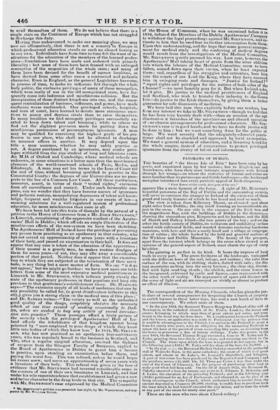The correspondent of the Morning Chronicle, who has given the
par- ticulars of several arrangements for despoiling the Church of property to enrich laymen in these latter days, has sent a new batch of facts to our contemporary. We select some of them. " In the year 1812, the Reverend Thonias Briggs was Prebend of the stall of Newington, in the cathedral church of Sr. Paul's, London; the manor and estates belonging to which were then of great extent mill value, and were leased in the usual way for three lives. By a combination between the Prebend and the lessees, an application was made to Pal lianient (on the pretence that it would be advantageous to the Church.) to authorize the Prebend to grant a lease for ninety-nine years, with an obligation for the succeeding Prchends to renew the lease at the period of every stiecetsling fifty years, on receiving. from the lessee in possession a fine of twenty shillings. Under this power, no the year 1614, the Reverend Thomas Di iggs executed a lease to W. Eitles and T. Eades, granting them two.thirds el this estate, and reserving one-third to the Church. The terms upon whit+ the lease was granted do not ripper, hut la the following year (1815) W. Eades sold his share of the lease for 25,000/. . . " In the ytar —, the Reverend Herbert Oakeley succeeded to the prebendal stall of Wenlocks Barn, in the same cathedral ; the estate of which is of great extent, and situate in St. Luke's, St. Leonard's Shoreilitch, and Islington. A part of this estate has been purchased by the Regent's Canal Company; and the purchnse-money (41,566/. 10s. 7,1. Three per Cents.) was then under the care of the Court of Chancery, for the porpaRe of purchasing other land to make good what had been sold. On the Oil of August 1825, the Revetend If. Oakeley executed a lease for twenty. one years to J. Johnson, 'F. thilyuake, and J. Lynes, the executors of the preceding Prebend ; and in the following year (1826) petitioned for an Act of Parliament, anti obtained it, on the plea of its being advantageous to the Church, which authorized him to receive from the amount deposited in Chancery 29,500/. sterling, to enable him to purchase back the lease which he had himself executed the year before, and to lease the whole or any part of the estate fur ninety-nine years." These are the men who rave about Church-robbery I


























 Previous page
Previous page